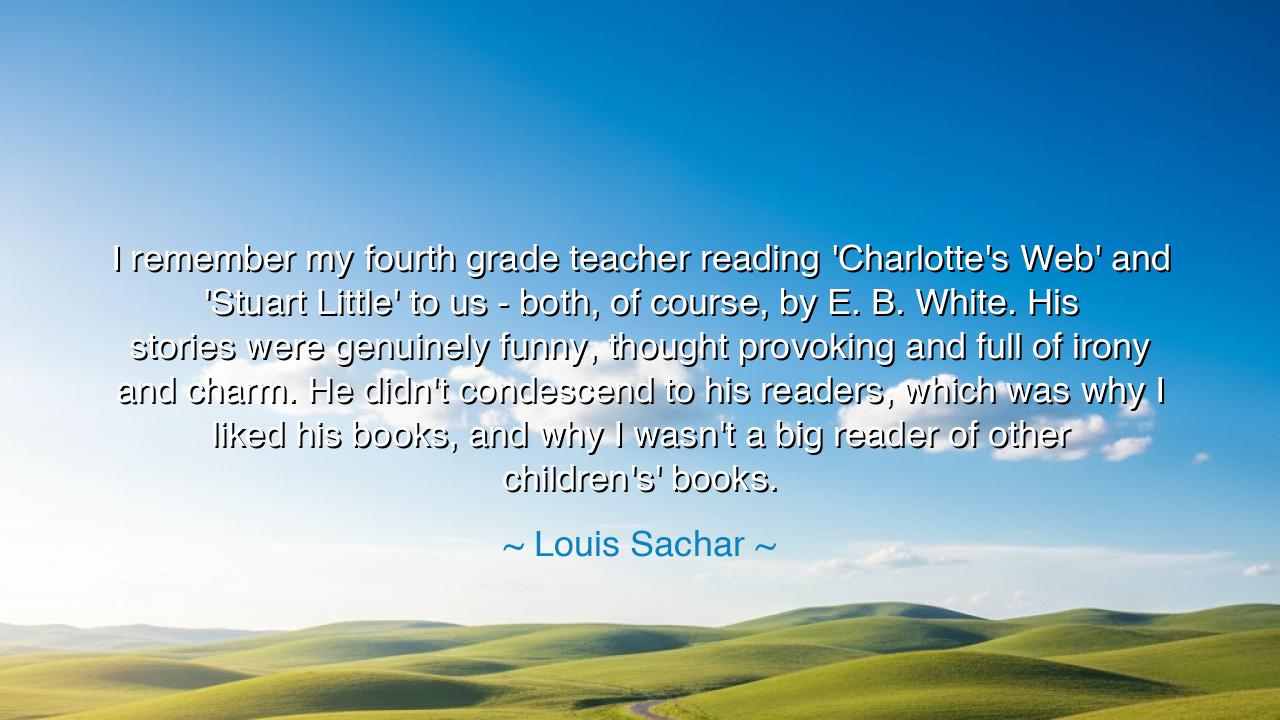
I remember my fourth grade teacher reading 'Charlotte's Web' and
I remember my fourth grade teacher reading 'Charlotte's Web' and 'Stuart Little' to us - both, of course, by E. B. White. His stories were genuinely funny, thought provoking and full of irony and charm. He didn't condescend to his readers, which was why I liked his books, and why I wasn't a big reader of other children's' books.






Louis Sachar, in recalling his childhood, gives us a glimpse into the mystery of how a young heart first awakens to the power of story: “I remember my fourth grade teacher reading Charlotte’s Web and Stuart Little to us—both, of course, by E. B. White. His stories were genuinely funny, thought-provoking and full of irony and charm. He didn’t condescend to his readers, which was why I liked his books, and why I wasn’t a big reader of other children’s books.” In these words, we see how a single encounter with a wise storyteller can open the door to imagination, shaping the course of a life and perhaps even preparing the way for Sachar’s own destiny as a writer.
The origin of this memory lies not only in the works of E. B. White, but in the sacred role of the teacher. For it was not merely the books themselves that stirred young Sachar, but the moment of being read to, of hearing a story spoken aloud with reverence and delight. A teacher who shares a story becomes a bridge, carrying a child from the ordinary into the realm of wonder. Thus, the seed of creativity is planted not in isolation but in community, in the shared breath of one voice telling a tale to many eager ears.
E. B. White’s genius, as Sachar observed, was his refusal to condescend. He wrote for children not as though they were fragile vessels to be filled with sugar-coated morals, but as thinking beings worthy of wit, irony, and depth. The characters of Charlotte, Wilbur, and Stuart spoke truths of friendship, mortality, courage, and humor without ever insulting the intelligence of the child. This honesty is what made his works timeless, and what distinguished him from many other writers of children’s literature whose words remained shallow. Sachar, even as a boy, felt this difference and clung to it.
History offers many parallels. Consider Hans Christian Andersen, whose fairy tales were filled with sorrow and complexity, reminding children that life is not always gentle but that beauty can be found even in pain. Or think of J. R. R. Tolkien, who insisted that fairy tales should not be dismissed as mere entertainments for the young, but should be given the same seriousness as the greatest epics. Like White, these authors refused to belittle their audience, and in doing so, they gave generations stories that would endure across the ages.
The emotional heart of Sachar’s recollection lies in the power of respect. Children sense when they are being deceived, when their minds are underestimated. To offer them stories of genuine depth is to honor their humanity and their capacity for wisdom. To offer them shallow tales is to teach them, unconsciously, that their thoughts and feelings are of little worth. Sachar loved White because White treated him as an equal in imagination, and in that equality he found joy.
The lesson for us is clear: whether as writers, teachers, or parents, we must never condescend to the young. Speak truth, even in simplicity. Share humor, irony, and beauty, for children are more capable of grasping such things than we often allow ourselves to believe. Respect is the foundation upon which trust and inspiration are built. To underestimate a child’s mind is to stunt its growth; to challenge it with honesty is to let it soar.
Practically, this means filling the lives of children with stories of substance. Read aloud not only what is easy, but what is rich. Encourage them to wrestle with difficult questions, to laugh at clever humor, to feel the weight of loss and the warmth of love through literature. And in your own life, remember that every human being, no matter their age, deserves the dignity of being spoken to with sincerity and respect.
Thus, Sachar’s memory is more than nostalgia; it is a teaching. Stories, told with respect, plant the seeds of greatness. A teacher’s voice, a writer’s honesty, a child’s listening heart—these weave together to shape futures unseen. Carry this wisdom with you, O listener, and whenever you speak to the young, let your words be filled with truth and wonder, for from such words are born the creators of tomorrow.






AAdministratorAdministrator
Welcome, honored guests. Please leave a comment, we will respond soon